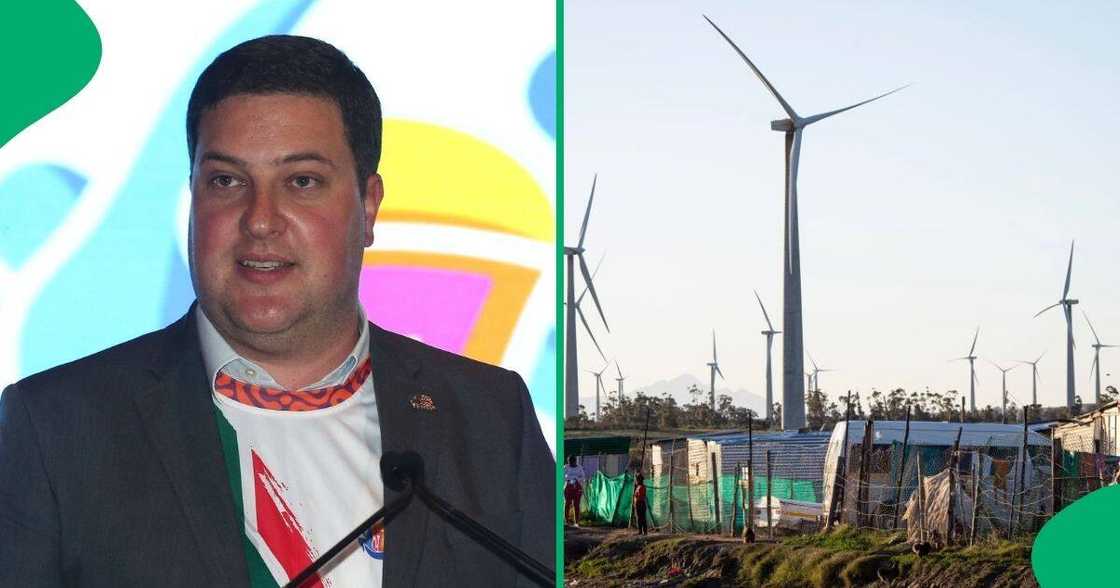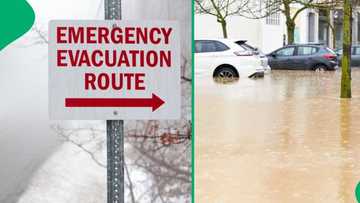Cape Town Mayor Plans Legal Action Against "Illegal Occupants" Amid Flood Crisis
- Cape Town Mayor Geordin Hill-Lewis plans to remove "illegal occupants" from municipal infrastructure, which is exacerbating the city's flooding issues
- This follows heavy winter rains causing widespread devastation, with 37 high-priority zones identified
- An analyst told Briefly News that there was an urgent need for long-term solutions and humane relocation handling while humanitarian aid efforts continued
PAY ATTENTION: Let yourself be inspired by real people who go beyond the ordinary! Subscribe and watch our new shows on Briefly TV Life now!
Reitumetse Makwea, a Briefly News current affairs journalist in Pretoria, South Africa, has covered court, accidents, weather and crime-related news at The Citizen and Rekord Noweto for over five years.

Source: Getty Images
Cape Town Mayor Geordin Hill-Lewis has announced plans to initiate legal proceedings to remove "illegal occupants" who have constructed homes atop municipal infrastructure, exacerbating the city's flooding problems.
This action follows recent heavy winter rains that have wreaked havoc across the province, with flooding causing widespread devastation.
See the post on X below:
Mayor identifies high-priority zones
Speaking to 702, Hill-Lewis said the 37 high-priority zones, primarily in informal settlements, have been identified where structures block drains and worsen flood conditions.
See the video on X below:
"Our primary focus is securing alternative accommodation. However, with over 20,000 homes affected, this task has proven to be extremely challenging. They're living in very tough conditions."
The mayor's announcement has sparked various experts' and activists' responses, highlighting the situation's complexity and urgency.
While necessary, experts criticised the timing
Mark Smith, an Urban Planning expert, told Briefly News that while the mayor's intention to clear infrastructure blockages was understandable, the focus must also be on long-term solutions, especially with thousands of people displaced.
"These include improved urban planning and the development of sustainable housing alternatives. The legal route may provide a short-term fix, but without addressing the root causes of illegal settlements, the problem will likely persist."
Kgomotso Rapetsoa, a human rights activist, said forced evictions often lead to human rights violations and that the focus should be on collaboration and community involvement in finding sustainable solutions.
"Especially when alternative accommodations are not adequately prepared. We urge the city to ensure that any removals are conducted humanely, respecting the dignity and rights of the affected individuals.
"We understand the need to address the flooding crisis, but evictions are not the answer. Displacing families without proper arrangements for their relocation will only create more problems.
"The city should engage with community leaders to find mutually beneficial solutions prioritising safety and housing stability."
Rapetsoa also told Briefly News that the recent floods have shown the vulnerability of many communities.
"While some structures may indeed obstruct drainage systems, many residents had no choice but to build where they could find space.
"We call on the government to expedite the provision of adequate housing and infrastructure improvements to prevent such crises in the future."
Gift of the Givers to continue Western Cape operations until Sunday, Langa is still in distress
Briefly, News reported that the Gift of the Givers has confirmed its intention to extend its humanitarian aid relief efforts in weather-affected Western Cape communities.
Gift of the Givers said in an exclusive interview with Briefly News that the move came amid conditions expected to worsen.
Project Manager Ali Sablay said operations would continue until Sunday as thousands were dependable on daily hot meals.
PAY ATTENTION: Follow Briefly News on Twitter and never miss the hottest topics! Find us at @brieflyza!
Source: Briefly News




